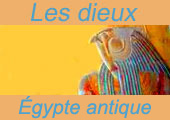Pakhet
- Pakhet
-
Pachet
Pachet est une autre appellation de la déesse Pakhet signifiant « la Déchireuse ». C'est l'une des nombreuses lionnes du panthéon égyptien, image et protection du pharaon.
Pachet est représentée sous la forme d'une lionne et est une émissaire du dieu Rê dans l'extinction de la race humaine. Elle peut donc être confondue avec la Vache Céleste Hathor-Sekhmet-Bastet (toutes trois filles de Rê). Pachet était une déesse terrifiante.
On devait s'en méfier car elle pouvait détruire l'Égypte si elle le voulait et un temple fut construit en son honneur à l'embouchure d'un cours d'eau, à Béni-Hassan. Ce temple s'appelle le Spéos Artémidos et fut embelli par de nombreux souverains.
Catégorie : Divinité égyptienne
Wikimedia Foundation.
2010.
Contenu soumis à la licence CC-BY-SA. Source : Article Pakhet de Wikipédia en français (auteurs)
Regardez d'autres dictionnaires:
Pakhet — In Egyptian mythology, Pakhet, Egyptian Pḫ.t , meaning she who tears (also spelt Pachet, Pehkhet, Phastet, and Pasht) is considered a synthesis of Bast and Sekhmet, ancient deities in the two Egypts who were similar lioness war deities, one for… … Wikipedia
Ancient Egyptian religion — Part of a series on Ancient Egyptian religion … Wikipedia
Osiris — For other uses, see Osiris (disambiguation). Osiris Osiris, lord of the dead. His green skin symbolizes re birth. God of the afterlife Name in hieroglyphs … Wikipedia
Horus — For other uses, see Horus (disambiguation). Horus Horus was often the ancient Egyptians national patron god. He was usually depicted as a falcon headed man wearing the pschent, or a red and white crown, as a symbol of kingship over the entire… … Wikipedia
Hatshepsut — Pharaoh Infobox Name=Hatshepsut Caption=Statue of Hatshepsut on display at the Metropolitan Museum of Art Reign=1479 ndash;1458 BC Dynasty=18th Dynasty Predecessor=Thutmose II Successor=Thutmose III Prenomen= Maatkare Truth Ma at is the Ka of Re… … Wikipedia
Nephthys — was normally portrayed as a young woman, wearing a headdress in the shape of a house and basket Goddess of Lamentation Name in hieroglyphs … Wikipedia
Min (god) — Min The fertility dark skinned god Min, with an erect penis and a flail God of fertility Name in hieroglyphs … Wikipedia
Ancient Egyptian burial customs — Anubis was the ancient Egyptian god associated with mummification and burial rituals. Here, he is shown attending to a mummy … Wikipedia
Beni Hasan — (also written as Bani Hasan, or also Beni Hassan) ( ar. بني حسن) is a village in Middle Egypt about 25 km south of al Minya, on the east bank of the Nile, with remarkable catacombs that have been excavated. During the Middle Kingdom, it was the… … Wikipedia
Egyptian pantheon — … Wikipedia


